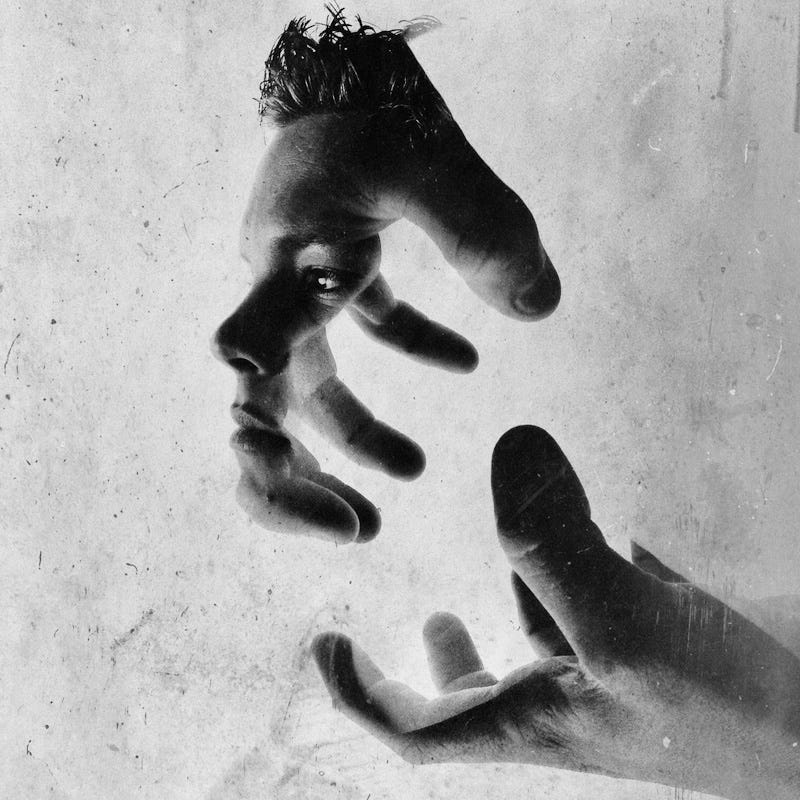The Entrapment of Consciousness
Depersonalization and ego-identification are really two sides of the same coin - and how awakening relates to both
“Shiv - I’m wondering if you can shed some light on a question that I’ve had for some time.
Many years ago, I experienced a period of depersonalization/derealization that was deeply distressing to me and my family. It was triggered by the sudden death of a college friend due to alcohol poisoning. The experience came over me suddenly and I had no way of reversing it. I felt completely outside my own body and unable to connect with it. I couldn’t feel any emotions but fear—my family members felt like strangers to me. Even though I recognized them and knew I should be feeling love for them, that love felt like it belonged to someone else. This was harrowing to say the least—not at all “liberating” as awakening has been described. I could not engage with society as everything appeared surreal and “plastic-like”. It was like being trapped in a nightmare that I couldn’t awaken from. It was through the use of prescription medication that I was finally able to reconnect with my body.
Many of the symptoms of awakening you (and other teachers) have described mirror some of the things I experienced. Yet, there was absolutely no positive takeaway, even in hindsight, from my DPDR experience.
My question is—what is the difference between what I experienced and an “awakening”? Is what is commonly called enlightenment just a positive spin on a permanently dissociated state?”
.
***
.
This is an important question and I thank you for sharing your experience.
There is a lot of nuance that gets missed when talking about such topics for a number of reasons:
First, psychological sciences often treat the individual ego as the core self, so experiences that deviate from it are framed as anomalies. When such a deviation becomes pathological - it is considered either a dissociative disorder or a form of psychosis.
Spiritual traditions, on the other hand, view the impersonal witnessing awareness as the core self - and the individual ego as a kind of temporary facade. So any experiences that cause that facade to fall away are generally considered favorable.
Yet, both these stances are limited in their own way because they fail to consider the paradoxical nuances of human existence. I.e. that these two aspects of self - the personal and the impersonal - the human and the being - are always overlapping.
In fact, one can roughly map these two aspects to the two hemispheres of the brain wherein each hemisphere experiences the self in a radically different way when compared to the other. Jill Bolte Taylor’s famous TED Talk, about what she experienced when she had a stroke that shut down one hemisphere of her brain, illustrates the point well.
(I want to pause here and mention that I am aware that a lot of this left-brain/right-brain dichotomy has been studied and revealed to be not quite so black and white. However, my point in writing this is not to make a study of brain anatomy but instead employ it as a useful approximation for the two phenomenologically different experiences of self that a human being is capable of.)
A healthy state of consciousness exists when the self-experience of both hemispheres is balanced - thereby generating the experience of wholeness. This is what individuation looks like - one in which the border between personal self and impersonal witnessing awareness becomes so fluid that a seamless moving between the two modes of perception is one’s default state.
However, that isn’t the case for most of humanity. Most people, as you are aware, are excessively dominated by the left-brain’s projection of the self a.k.a the ego. And this is a widespread, though normalized, pathological condition. Pathological - because many are stuck in that mode and have no reprieve from it. Our ideas about ourselves form the scaffolding of our identities - and these identities are so critical to our existence that they supersede the needs, the well-being and, in some cases, even the physiological reality of our bodies.
In other words, “over-personalization” is also a kind of disorder - one that holds the self captive in the identity-based framework of the left brain. The problem is - when the vast majority of the world operates in that way, it can’t be viewed as a disorder - it’s simply business-as-usual.
Spiritual traditions, on the other hand, do recognize this ego-fixation as a disease. Which is why so much attention and energy is devoted towards ‘liberating’ seekers from it. These traditions are acutely aware that there is another realm of reality and a whole different capacity of perception that we are capable of - one that is native to the way the right brain perceives the world. The problem is, in proposing the conundrum in such a way - it merely sets up another bias. One in which the impersonal witnessing awareness is labelled ‘the real self’ - and the ego, a hallucination.
Dissociation is, therefore, a common pitfall among seekers. Milder versions manifest as a general listlessness, disinterest and apathy towards one’s life. And more severe manifestations involve people suddenly abandoning their own spouses and children, acting in ways that are exploitative and lacking in empathy towards others (see the long laundry list of cultish gurus) and psychosis.
Now, let me directly address your question by illuminating the crucial difference between a DPDR experience and ‘awakening’.
Keep reading with a 7-day free trial
Subscribe to Dark Knight of the Soul to keep reading this post and get 7 days of free access to the full post archives.


